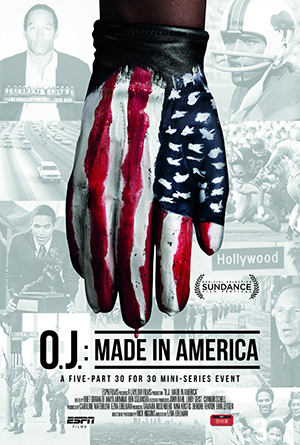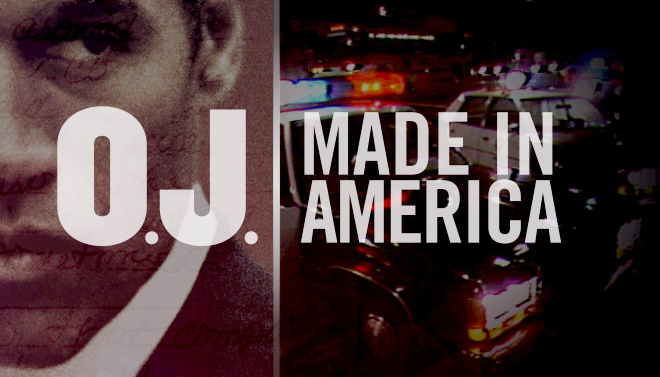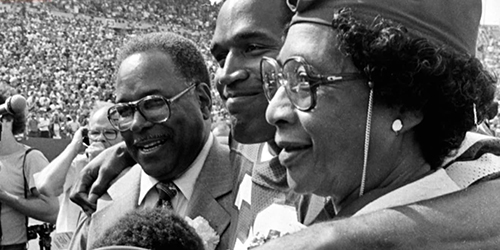Doc Corner: 'O.J.: Made in America' a Compelling Success
 Tuesday, June 28, 2016 at 12:00PM
Tuesday, June 28, 2016 at 12:00PM Glenn here with our weekly look at documentaries from theatres, festivals, and on demand. This week we're looking at ESPN's much-buzzed five-part documentary about O.J. Simpson.
 Even more coincidental than the release of ESPN’s O.J.: Made in America so soon after Ryan Murphy’s star-studded FX mini-series, The People v. O.J. Simpson, is that the rise to fame of their subject coincided so precisely with the rise to prominence of the African American civil rights movement. The irony was not lost on Simpson with the handsome man who everyone thought “had it all” never being able to out-run the shadow that his own meteoric ascent cast over seemingly the United States’ entire black population. Nor is it lost on director Ezra Edelman who makes the parallels the structural spine of this exceptionally thorough, exquisitely compiled, and exhaustively compelling five-part documentary. It’s not called “Made in America” for nothing – another coincidence it’s worth noting, Made in America is also the name of a pretty good 2008 documentary about the Crips and Bloods war in L.A. by Stacy Peralta – and across 463 minutes, Edelman and his collaborators have crafted a powerful demonstration of the dichotomy of race, fame, and justice in America.
Even more coincidental than the release of ESPN’s O.J.: Made in America so soon after Ryan Murphy’s star-studded FX mini-series, The People v. O.J. Simpson, is that the rise to fame of their subject coincided so precisely with the rise to prominence of the African American civil rights movement. The irony was not lost on Simpson with the handsome man who everyone thought “had it all” never being able to out-run the shadow that his own meteoric ascent cast over seemingly the United States’ entire black population. Nor is it lost on director Ezra Edelman who makes the parallels the structural spine of this exceptionally thorough, exquisitely compiled, and exhaustively compelling five-part documentary. It’s not called “Made in America” for nothing – another coincidence it’s worth noting, Made in America is also the name of a pretty good 2008 documentary about the Crips and Bloods war in L.A. by Stacy Peralta – and across 463 minutes, Edelman and his collaborators have crafted a powerful demonstration of the dichotomy of race, fame, and justice in America.
Starting in the 1960s with Simpson’s rise in college football, Edelman’s film wisely doesn’t focus exclusively on the murder of Nicole Brown and Ron Goldman and the trial that followed. In fact, it takes until the third episode to even bring it up, instead preferring to spend time examining these early passages of his life for clarity and for clues. Unlike the FX series, O.J.: Made in America is more concerned with attempting to find out how a man like Simpson and the country came to be. [more...]

Many of the series’ most fascinating moments in fact have nothing at all to do with the trial that turned his fame to infamy. I was riveted by the tales of his groundbreaking turn as a spokesman for Hertz, O.J.'s discovery of his father's homosexuality, and one particularly gutsy sequence (kudos to editors Bret Granato, Maya Mumma, and Ben Sozanski) that intercuts the assassinations of Martin Luther King, Jr. and Bobby Kennedy with Simpson being praised by Bob Hope for not being, essentially, an angry black man. Just as revealing, Simpson’s silence during passages devoted the brutal bashing of Rodney King and the murder of Latasha Harlins.
The two O.J. series actually work well to complement each other, fleshing out and revealing more from within their stories without ever becoming repetitious of one another (I watched the ESPN doc a week after finishing the FX series). The trial footage seen here was fascinating to me, partly due to having not been privy to the daily rigmarole of the trial having grown up outside of America, and partly because it was so interesting to see how accurate the likes of Paulson, Vance, Brown and Travolta were in their recreations.
Throughout, Edelman gets great talking head interviews out of a bevy of people (72 all up) involved including Marcia Clark, Carl Douglas, F. Lee Bailey, Ron Goldman’s father, several jurors, friends of O.J. and Nicole, and many of the police involved including, quite surprisingly, Detective Mark Fuhrman who uses his appearance to clear his name (although there are no references to his apparent taste for Nazi paraphernalia that the HBO series suggested). You decide whether he succeeds or not. Of those who are still alive, it is Christopher Darden’s absence that is most dearly felt. What would the young African American lawyer who many - including a juror interviewed within - contend lost the state the case have to add about all of these issues upon reflection 20 years later?

By episode five when the doc comes back around to where it began, Simpson’s 2007 arrest in Las Vegas for armed robbery and kidnapping, Edelman’s documentary has swerved through a whole litany of issues that combine to make an essential piece of long-form documentary filmmaking akin to Jean-Xavier de Lestrade’s astonishing The Staircase. Edelman’s primary goal isn’t one of proving one way or the other about whether Simpson killed anybody – although it gets close enough – but investigating how a man such as him got to a position where we have to ask such a question at all. It’s an indictment on so many people it’s hard to keep track, but ultimately it’s a sad and troubling glimpse into a part of American life and culture that, to this day, remains as relevant as ever.
Release: All five parts can be streamed at ESPN.
Oscar Chances: Here's where it gets tricky. We've been hearing for a while now that the film has been given an Oscar-qualifying cinema release before it played on television, which is all well and good, but should it be eligible in the first place? This isn't just a case of a feature-length documentary playing both in cinemas and on TV - like all HBO and Netflix docs, which is why they often appear on both Oscar and Emmy lists - but a clearly made-for-TV event. Will we soon start seeing programs like Making a Murderer or The Jinx competing for slots against Cutie and the Boxer? They are claiming that it was conceived and made as a 7 ½-hour movie, not five 90-minute episodes. I'd believe that. And yet did anybody know? Did they give people the chance to actually see the whole thing in theatres? I'm not sure how this will pan out (will critics groups play ball just to be with it?), but qualifying for Oscar seems like an egregious stretch of the qualification bow. This isn't Shoah! And if it ultimately does qualify? Well, that's uncharted terrain. I'd be intrigued to see what happens, even though I don't agree it should qualify.



Reader Comments (4)
Christopher Darden’s absence that is most dearly felt. What would the young African American lawyer who many - including a juror interviewed within - contend lost the state the case have to add about all of these issues upon reflection 20 years later?
Before Oprah's daytime talk show ended. She interviewed Chris Darden. There's also a follow up with him for her where are they now. That clip you can find on You Tube.
This was an absolutely fascinating doc. I was surprised at how intensely the principals of the case still felt -- Marcia Clark blaming everyone but the prosecution, a racist cop who was still incredibly racist, and even a juror who trashed both Clark and Nicole Brown.
My only quibble or point of ambiguity was how much contempt the filmmaker seemed to have for OJ. He mostly brought out the negatives of his career as an actor, football commentator, and pitchman. They interviewed people who said they hired him for films only because he was black, said he was awkward as a commentator, and the movie clips they showed were only Naked Gun and a terrible-looking tv movie starring Elizabeth Montgomery. I don't think he was that bad at his post-football career, and I wonder if there aren't some clips of OJ talking thoughtfully about race, or if the filmmaker just chose to paint a really negative picture.
As for the Oscar thing, no. This is a tv event, and trying to use technicalities to get an Oscar is bad precedent.
3rtful, I'll seek it out, but it feels like a missed opportunity for *this* film. I suspect he didn't want any part of it, but that's unfortunate.
Marsha, I think it may have had its own narrative that he had squandered some of his football talent for a career that ultimately didn't work out all that well potentially laying the foundation for unhappiness and anger. Maybe. There was the director of CAPRICORN ONE who I thought had some interesting things to say (particularly in his goodbye to O.J.) and was complimentary about his performance. Just looking at his IMDb profile now though and Simpson did make a movie in 1974 called KLANSMAN, which certainly sounds like it ought to have been an interesting addition given the idea that he rejected his race.
From this month Darden on The View.
https://www.youtube.com/watch?v=gbOWQEWXDcg